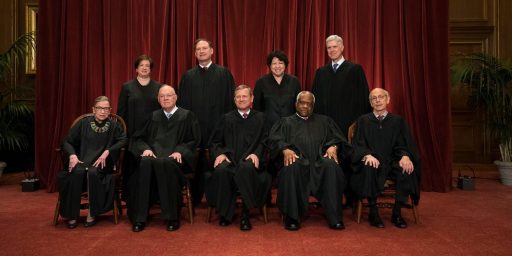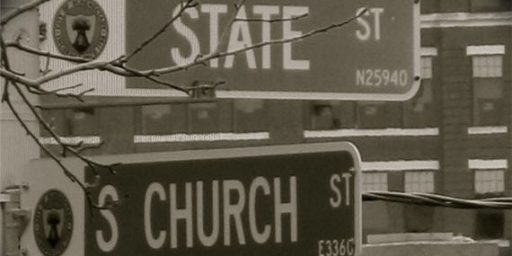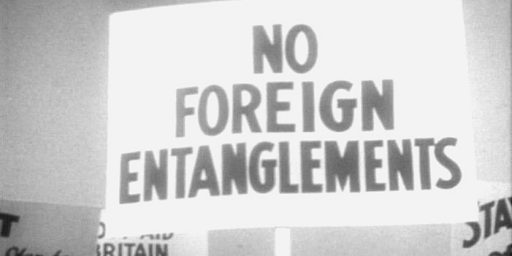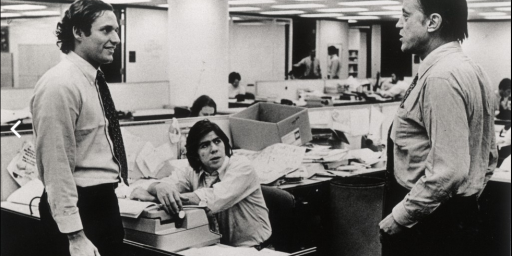Timing of the NSA Surveillance Story
James Rainey reports that the curious timing of last Friday’s New York Times story was designed, not to trample on the good news from Iraq as some conservatives contend, but to prevent being scooped by a book written by its own reporters.
Critics Question Timing of Surveillance Story (LAT)
The New York Times first debated publishing a story about secret eavesdropping on Americans as early as last fall, before the 2004 presidential election. But the newspaper held the story for more than a year and only revealed the secret wiretaps last Friday, when it became apparent a book by one of its reporters was about to break the news, according to journalists familiar with the paper’s internal discussions.
It should be noted that Michelle Malkin called this one right away.
Politicians, journalists and Internet commentators have feverishly aired the debate over the timing of the New York Times story in the last four days — with critics on the left wondering why the paper waited so long to publish the story and those on the right wondering why it was published at all. Conservatives suggested the Times had timed the story to persuade members of Congress to oppose reauthorization of the Patriot Act, the federal law that granted the government sweeping surveillance powers. They also charged that the newspaper wanted to short-circuit good news for the Bush administration — Iraq’s high-turnout, relatively violence-free elections.
Times Executive Editor Bill Keller rejected those alleged motivations and also the suggestion that the timing of the story was linked to next month’s scheduled publication of “State of War: The Secret History of the CIA and the Bush Administration,” the book by Times reporter James Risen that includes information on the National Security Agency spying program. “The publication was not timed to the Iraqi election, the Patriot Act debate, Jim’s forthcoming book or any other event,” Keller said in a statement. “We published the story when we did because after much hard work it was fully reported, checked and ready, and because, after listening respectfully to the administration’s objections, we were convinced there was no good reason not to publish it.”
The newspaper had reported Friday that it held publication of the story for “a year” because the White House had argued that it “could jeopardize continuing investigations and alert would-be terrorists that they might be under scrutiny.” In a statement over the weekend, Keller said the paper printed the story after more reporting, which uncovered additional “concerns and misgivings” about the surveillance and also persuaded Times editors that they could proceed and “not expose any intelligence-gathering methods or capabilities that are not already on the public record.”
The initial Times statements did not say that the paper’s internal debate began before the Nov. 2, 2004, presidential election — in which Iraq and national security questions loomed large — or make any reference to Risen’s book, due out Jan. 16. But two journalists, who declined to be identified, said that editors at the paper were actively considering running the story about the wiretaps before Bush’s November showdown with Democratic Sen. John F. Kerry of Massachusetts.
Top editors at the paper eventually decided to hold the story. But the discussion was renewed after the election, with Risen and coauthor of the story, reporter Eric Lichtblau, joining some of the paper’s editors in pushing for publication, according to the sources, who said they did not want to be identified because the Times had designated only Keller and a spokeswoman to address the matter. “When they realized that it was going to appear in the book anyway, that is when they went ahead and agreed to publish the story,” said one of the journalists. “That’s not to say that was their entire consideration, but it was a very important one of them.”
Both of the journalists said they thought that Times editors were overly cautious in holding the story for more than a year. But they said they thought the delays appeared to be in good faith, with the editors taking to heart the national security concerns raised by the Bush administration.
Kevin Drum observes,
So not only was the timing not intended to hurt Bush, it’s far more likely that the timing helped him considerably. After all, if this firestorm had been made public before the election, do you think a hundred thousand people in Ohio might have decided to change their votes?
It’s hard to say. After all, the president’s poll numbers are up since the story came out.
Still, Kevin’s right that the Times was clearly not motivated by malice in holding the story. On the other hand, we can rest assured that they weren’t trying to help Bush’s reelection chances, either. I did the backward math for my initial post on the matter:
It̢۪s December 16, 2005. So, they̢۪ve delayed it since [at least] December 16, 2004. The election was November 2, six weeks prior. Presumably, the time it took to set up and conduct the meeting with the administration and to make the decision took quite some time. Presumably, too, it took a while to do the first round of investigations. So, at a minimum, it̢۪s quite likely the NYT was working on this story during the last days of the campaign.
and noted that, the fact
That the NYT actually acceded to [administration’s request to delay publication]–during a tight election campaign, no less–is indication that they took it seriously, though.
Indeed, the more evidence that drips or way, the more likely it is that there is some major aspect to the program, presumably involving technology related to sources and methods, than the papers have reported.
Previously at OTB:
- Defending the Constitution
- The Rockefeller Letter on NSA Spying
- F.B.I. Watched Activist Groups, New Files Show
- Barbara Boxer and John Lewis Start Impeachment Talk
- The Need for Speed
- Why Didn̢۪t Bush Ask Congress?
- Catch Them, but Do Not Watch Them!
- Gonzales Says Congress Authorized Spying
- NY Times Endangers American Security (Stotch)
- Bush Acknowledges Approving Eavesdropping
- Official: Bush Approved Eavesdropping
- Specter and McCain Call for Investigation of NSA Spying
- Bush Allowed Warrantless Phone Surveillance After 9/11






I have just learned that in October 1982, The 6th District Federal Court of Appeals ruled that the wirtappine of foreign communications between overseas persona and US citizens without a court order is LEGAL.
I also learned that both Clinton and Regan did the same thing as Bush in the NSA wiretaps and cited the US Constitution as their legal approval.
Now, all you Bush Haters, lets hear your whining, and your disagreement with the Federal Courts. I am sure some of you will have more knowledge and expertise than the 6th Court.
At this point, who knows? Bush probably has public opinion on his side. The fact that senior democrats were briefed, apparently without objection, although Pelosi may have objected, takes away their credibility. It would be hard to make the case that the president should take weeks to go through the FISA process before following up on terrorists links in the US. The president will have to explain, however, why he did not avail himself of the opportunity to act first and then go for retroactive FISA approval. If, as you say, there may be a technolical angle here that cannot be revealed, the president will have to take the hit. I believe he will. Remember, though we neither know nor care about the unconstitutional actions that Lincoln and FDR (imagine, democrats still honor as their patron saint a president who placed an entire ethnic group into concentration camps) engaged in; we know that they defended the nation at a time of great peril, and they won.
Hmmm…had the story before the election. All the MSM, especially the NYT, hate Bush and would do anything to hurt him.
This pretty much confirms what I believed all along. All the republican’s crying about liberal media is nothing more than smoke and noise.
You gotta admit, if the NYT wanted Bush, they had the perfect opportunity. In fact, no wonder Bush had the NYT editor to the White House for a meeting. If the Times had printed the story, you’d be raving about how bad “President Kerry” is and calling for congressional hearings into the color of his socks.
“the fact that senior democrats were briefed, apparently without objection”, are you kidding?
Here’s the briefing:
“take a look at what we’ve been doing for some years now but keep in mind that this is super-top-secret so you can’t discuss this with anyone. So what do you think?”
We’ll it’s clear that Rockefeller was one pretty sharp guy with a lot of political foresight to write that letter and keep a copy. That alone blows the hugest hole in any argument of “we kept congress informed.”
On the other hand, maybe they really didn’t care how the democrats felt. I haven’t heard what the republicans who were “notified” thought about this.
…back to the “timing” thing.
I doubt that anyone in MSM would admit to it, but it wasn’t about being scooped. It was about generating buzz for their reporter’s book, which in turn would get the whole “illegal wiretapping” idea into circulation. I’ve seen them do it too many times… KABC in LA showing a holocaust related movie, then topping the news off interviewing Jews about what they thought of the movie.
This is no different.
Remember, the purpose of the media is to sell your eyeballs to the advertisers. Period.
http://www.nationalreview.com/mccarthy/mccarthy200512201735.asp
Where are the “Constitution Watchers” and protectors now that is is established fact that the writer if the NYT article had a financial intrest is publishing the story is spite of the fact that it was a “Highly Classified” secret.
Risen, the writer, apparantly didn’t give a damn about our countries securty in favor of his own financial gain. That has to be the lowest of lifeforms in the US, and to think that the democrats jumped on his, (Risens) bandwagon only proves their “patrotic” rohtoric is generated only by Hate.
James: “It’s hard to say. After all, the president’s poll numbers are up since the story came out. ”
Have any photogenic elections been held in Iraq lately?
James, are you seriously trying to say that publishing this story before the election wouldn’t have hurt Bush’s chances?
Still, Kevin’s right that the Times was clearly not motivated by malice in holding the story. On the other hand, we can rest assured that they weren’t trying to help Bush’s reelection chances, either. I did the backward math for my initial post on the matter:
It appears the Times was merely basing the timing on incompetence, then, am I right?
bryan: I don’t follow?
Because if the times had their heads on straight, they would have realized the reaction that would have followed from the publication dated as it was the days following the Iraq election. Given that they had sat on it for a year, why not wait a few more days if there was nothing pressing them to put it out. It’s not like this was a breaking story of a murder investigation or something that had to be out immediately.
“Incompetence” in this instance means the inability to see the forest (reaction to the timing of the story and its effect on the Times “credibility”) for the trees (publishing the story).
Ah. Yes, true enough. I’m not sure exactly when the book was coming out but one would think they could have waited a few days.